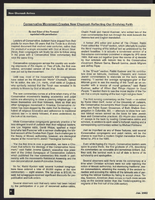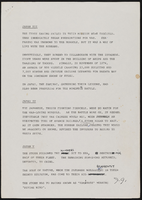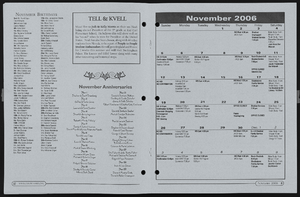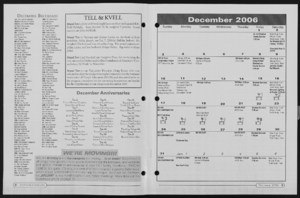Search the Special Collections and Archives Portal
Search Results
Mara Braun oral history interview
Identifier
Abstract
Oral history interview with Mara Braun conducted by Barbara Tabach on September 09, 2019 for the Latinx Voices of Southern Nevada Oral History Project. In this interview, Braun discusses growing up in Puerto Rico, family life, and moving to Indiana in the 1960s. She describes summer visits to Mexico City, Mexico, meeting her husband there, and converting to Judaism. Braun talks about her experiences as a Puerto Rican Jewish convert living in Mexico City, and moving to Las Vegas, Nevada in 1975. Later, Braun discusses how she got started in catering and opening her catering business, Le Royal Dreams. Lastly, Braun talks about her diverse clientele.
Archival Collection
Maria Benítez oral history interview
Identifier
Abstract
Oral history interview with Maria Benítez conducted by Monserrath Hernández and Maribel Estrada Calderón on June 21, 2019 for the Latinx Voices of Southern Nevada Oral History Project. Maria Benítez is the image of a hardworking and determined Salvadoran woman. After facing adversity amidst the Salvadorian Civil War she talks about her journey as a nurse in El Salvador and migrating to the United States. Here in Las Vegas, she has worked as a cook on the Strip, been an active member of her church, and supported the education of her children selling pupusas. Subjects discussed include: El Salvador, Salvadorian Civil War, Migration, US Citizenship Documentation, and Judaism.
Archival Collection
Audio clip from interview with Beverly Mason, December 21, 2012
Date
Archival Collection
Description
Part of an interview with Beverly Mason, December 21, 2012. In this audio clip, Mason discusses the importance of church in her upbringing and in the African American community.
Sound

Transcript of interview with Margo Mink Colbert by Barbara Tabach, November 11, 2014
Date
Archival Collection
Description
Interview with Margo Mink Colbert by Barbara Tabach on November 11, 2014. Colbert discusses her upbringing in New York and her schooling at the High School of Performing Arts and Julliard. She is a choreographer and faculty member at the University of Nevada Las Vegas.
Margot Mink Colbert was born in 1935 in New York City, to parents of different economic backgrounds who shared a Jewish immigrant heritage. She attended Julliard and studied under modern dance pioneers like Martha Graham and Jose Limon. Margot honed her skill for choreography, and took her first job in academia as a Senior Lecturer in the dance department at the University of Wisconsin-Madison. In 1991, she moved to the University of Nevada, Las Vegas to take a one-year appointment as an instructor. A year later, she was hired into a tenure track position. Margot is now a Professor at the University of Nevada-Las Vegas, assistant chairperson of and Director of Ballet in its Department of Dance. In addition, she continues to direct Ballet Mink, a dance company she founded in 1970.
Text






